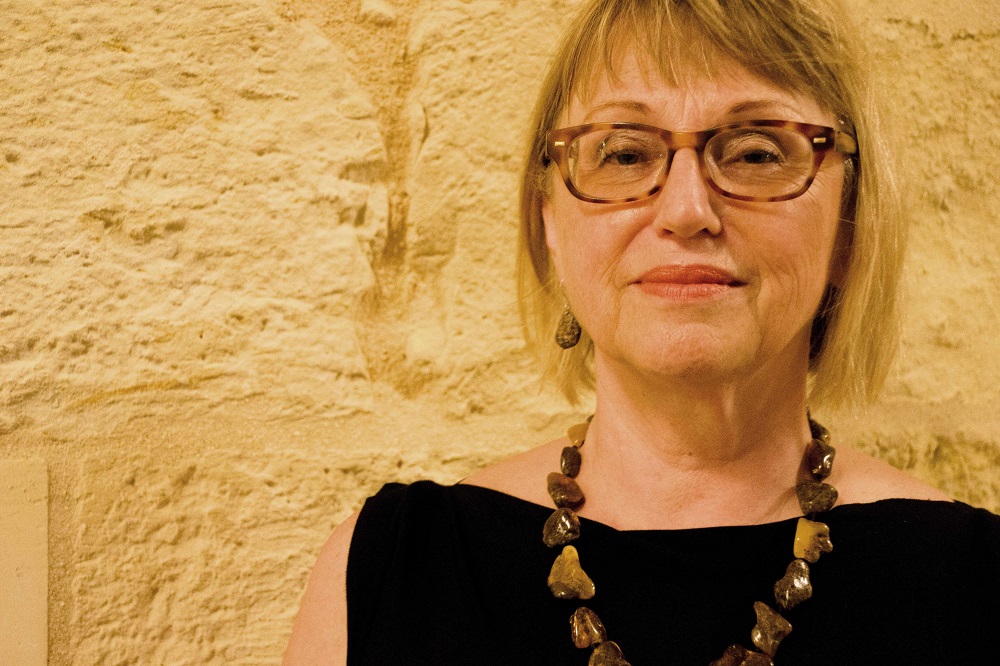By Stuart Mitchner
 “The only way to even begin to understand language is to love it so much that we allow it to confound us and to torment us to the extent that it threatens to swallow us whole.”
“The only way to even begin to understand language is to love it so much that we allow it to confound us and to torment us to the extent that it threatens to swallow us whole.”
I keep returning to that impassioned sentence from Jhumpa Lahiri’s Translating Myself and Others (Princeton University Press $21.95). The sense of spontaneous energy behind Lahiri’s use of the word “love” is in stunning contrast to the standard “I was struck by” or “I admired” used in other, earlier contexts; in one of the translations she quotes from, the word love is “merely ‘a container we stick everything into,’ a hollow place-holder that justified our behaviors and choices.” Here it comes across as fresh, reinvigorated, uncontained, unconditional, and even heroic, given the challenges she brings tumultuously into play.
The Cracked Kettle
Lahiri’s embattled devotion to language brings to mind Gustave Flaubert’s performance on a similar theme in Madame Bovary: “Human speech is like a cracked kettle on which we beat out tunes for bears to dance to when we long to move the stars to pity.” In the original it’s “la parole humaine est comme un chaudron fêlé ou nous battons des mélodies à faire danser les ours, quand on voudrait attendrir les étoiles.”
The English version has a Shakespearean kick that makes Flaubert’s mot-juste French appear unwieldy; but that’s how the words look on the page: say them aloud, and it’s another story, another song.
Looking in the Mirror
Lahiri says that “to translate is to look into a mirror and see someone other than yourself.” Even when you’re not the translator, you can imagine Constance Garnett’s bespectacled face in the mirror when reading Chekhov. You know and trust her, she’s given you the Russians, and in Chekhov’s stories and letters, which you come back to again and again, her translations bring you closer to him than any other. Of Garnett’s Turgenev, the first of the Russian giants she brought to English-speaking readers, Joseph Conrad said “Turgenev is Constance Garnett and Constance Garnett is Turgenev.” Ernest Hemingway makes essentially the same point in A Moveable Feast. For him, the language of Tolstoy was the language of the Englishwoman who began to go blind while translating War and Peace. D. H. Lawrence recalls seeing her sitting in her garden “turning out reams of her marvelous translations from the Russian. She would finish a page, and throw it off on a pile on the floor without looking up, and start a new page. That pile would be this high — really, almost up to her knees, and all magical.”
Dealing With the Subjunctive
In an early chapter titled, “An Ode to the Mighty Optative,” Lahiri describes the subjunctive as “the grammatical repository for all things imprecise, uncertain, or otherwise incapable of being pinned down definitively.” As someone whose high school English experience was plagued by sentence diagramming, dangling participles, and unruly subjunctives (not to mention a grammarian father who wrote but never published a book glorifying the Mighty Diagram), I’m thankful for Lahiri’s solution. Why diagram sentences when you can put all those confounding, tormenting, all-consuming participles and gerunds in the storage locker of the subjunctive?
Roller Coaster
Along with Translating Myself and Others, I’ve been enjoying the stories in Lahiri’s 2008 collection, Unaccustomed Earth. The various positive reviews quoted in the Vintage paperback observe that she “handles her characters without leaving any fingerprints,” that she “allows them to grow as if unguided,” and that she “steps back from the action, gets out of the way.” There’s also praise for her “modulated prose.” Yet when she’s expounding on translating and translations, her fingerprints are all over the place. Of translating Ovid’s Metamorphoses, “Though I read slowly and haltingly, I also fell headlong into the poem.” She also soars and glides, she even gropes: “To translate is to walk down numerous scary corridors, to grope in the dark,” like “walking through a hall of mirrors.” She finds a “teeter-totter element” running through novelist Domenico Starnone’s Trust, one of the books she translated from the Italian, wherein she describes “high adrenaline” diversions like roller coasters: “Starnone often pauses at the precise moment in which the roller coaster, creeping upward on its trajectory, briefly pauses before hurtling back down.” Each time “the moment of drastic transition signals a plunge, a lurch, a swoop, a turning upside-down.”
In the afterword to her translation of Trust, Lahiri comes right off the page exulting about Starnone’s “breathtaking panoramas … heart-dropping anxiety, primal screams, and hysterical laughter.” When she says, “Something tells me that Starnone has a hell of a good time laying down these tracks,” he’s obviously not the only one having a good time.
With a Wary Eye
This is the 100th anniversary of the publication of T.S. Eliot’s The Wasteland and James Joyce’s Ulysses. If you discovered Eliot’s “Prufrock” and Joyce’s Portrait of the Artist” on your own around the time you were reading J.D. Salinger’s The Catcher in the Rye, you gazed ahead to the famously “difficult” later works with a wary eye. The fact that I might need a guide, or even a translator, roused my inner Holden Caulfield, and when, at 16, I saw the Latin epigraph on the first page of The Wasteland, I swaggered into the “the cruelest month” with a chip on my shoulder, like Holden in a theater lobby full of “phonies” swooning over “the marvelous Lunts.” In “Prufrock” Eliot simply pulls you aboard (“Let us go then, you and I”) and in Portrait Joyce disarms you with the bedtime storyline of the moocow coming down the road.
What actually brought on my Wasteland-epigraph déjà vu was the sight of the two masses of untranslated ancient Greek looming like a closed double gate to the “Mighty Optative” chapter. Lahiri opened the way, however, locating both citations in different sections of Aristotle’s Poetics on the way to discussing the future games of the optative in reference to the doomed couple in Ernest Hemingway’s story “Cat in the Rain,” which is set in Italy, the country where Lahiri found the language she loves.
Translating a Country
One thing that animates Lahiri’s writing about translating and translations is the way she plunges into the task as if the language and the country were one living element, air, light, music, and ambiance. Although Italy was also the first foreign country I felt that way about, then Greece, the most momentous experience was India, about which I’ll paraphrase Lahiri: you love it so much that you let it confound and torment and threaten to swallow you whole; and out of the concatenation of forces that make the subcontinent so immense an experience, it’s the language that immediately engages and amuses and amazes you, not Hindi or Urdu or Bengali, but the ungainly transplant formed from Victorian-era English on posters and sign boards and newspapers and books (Lahiri might see it as an example of “grafting,” from the Italian word innesto). On my way overland from Trieste I felt at home for the first time in India’s never never land of language, part-British Empire, part rock ’n’ roll America, part Hollywood. One of my favorite examples turned up above the title of a yellowed paperback of Northanger Abbey that I bought at an Indian Railways newsstand: “Cunning! Compassioned! Strangely Touchy!”
“Every Word Twisted”
Franz Kafka enters Translating Myself and Others in the third chapter, when Lahiri mentions Gregor Samsa in the context of Kafka’s “obsession with the body, physical discomfort, weakness, and disease.” She mentions the Diaries in particular, as “a heterodox merging of observation and storytelling,” marked by Kafka’s “charged relationship to physical space.”
For years now I’ve been reading and living in the charged space of Diaries 1914-1923, which was translated by Martin Greenberg “with the cooperation of Hannah Arendt.” The final entry is dated June 11, 1923, about a year before Kafka’s death in June 3, 1924: “More and more fearful as I write. It is understandable. Every word twisted in the hands of the spirits — this twist of the hand is their characteristic gesture — becomes a spear turned against the speaker. Most especially a remark like this. And so adinfinitum. The only consolation would be: it happens whether you like or no. And what you like is of infinitesimally little help. More than consolation is: You too have weapons.”
The first two sentences make sense in the context of a book about translation. But any translator might feel a chill, even a touch of vertigo, confronting a sentence referring to words twisted and turned “against the speaker.” And given the spreading plague of disinformation in May 2022, and the war in Ukraine, whatever’s impending on Kafka’s “physical space” feels unnervingly resonant.
Adblock test (Why?)






